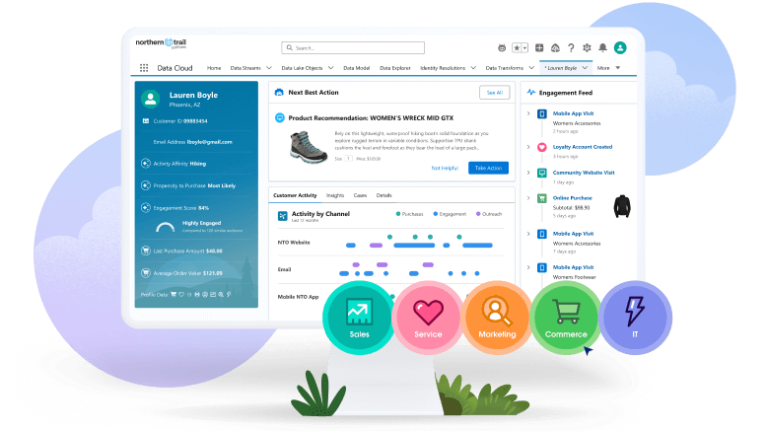


.png)
.png)
As a founder of a small business, your time is limited, and every decision must earn its place. You need tools that simplify operations, not complicate them. This guide explains, in clear language, how a Customer Relationship Management (CRM) system helps your teams, why Salesforce CRM is a strong choice, and how to choose the right implementation partner — especially one that understands small teams, like Proso AI.
This article is optimised for founders who want quick, practical answers and an action plan: what the CRM will change, how it helps sales and marketing, and what to expect during implementation.
A CRM (Customer Relationship Management) system is a platform that helps your business manage all interactions with customers; existing and potential. It acts as a single source of truth for your sales, marketing, and service teams.

A CRM helps you track leads, close deals, engage customers, and see everything your teams are doing - in one place.
These issues are extremely normal—but they become roadblocks as you start growing.
.png)
A CRM solves these problems by creating order, visibility, and accountability.
Even though CRMs are popular in large companies, small businesses actually benefit more because:
If you lose a potential customer due to poor follow-up, that loss hits you harder than it would a large company.
Every team member needs to be extremely productive and coordinated.
You cannot afford blind spots when it comes to sales performance, customer activity, or potential opportunities.
Founders often spend hours pulling data, reminding teams, and running operations manually.
When your business grows, a CRM ensures your processes grow with you.
In short: a CRM is not a luxury; it’s an operational necessity for a small business that wants to compete and grow effectively.
.png)
Salesforce is the world’s #1 CRM platform. It’s used by startups, mid-sized businesses, and Fortune 500 companies; but it’s especially powerful for small businesses because it is:
Unlike basic CRMs, Salesforce is not just a tool—it’s an ecosystem. You can manage everything from sales pipelines to marketing automation to customer support.
For a small business, this means:
Let’s explore the features in more detail.
Below are the most useful Salesforce features that directly help startups and small companies.
Salesforce helps your sales team:
You stop depending on guesswork and get complete visibility into your sales pipeline. You can see:
This ensures you can make faster decisions and guide your team better.
Salesforce automates your repetitive tasks:
Automation reduces human error, speeds up daily work, and frees up your team so they can focus on closing deals—not managing spreadsheets.
Salesforce allows your marketing team to:
This means your marketing team will generate better quality leads, and your sales team will close faster.
For small businesses, customer support can make or break your reputation. Salesforce helps you:
As a founder, this is extremely valuable because customers feel heard and valued.
Salesforce gives you dashboards that tell you:
This data clarity is what most small business founders lack.
Most small businesses already use tools like:
Salesforce integrates with almost everything.
Which means your operations remain smooth, and you don't have to change your existing tools.
Setting up Salesforce is powerful—but also complex. Many founders think, “We’ll set it up ourselves.”
But here’s the truth:
A poorly implemented CRM becomes useless, frustrating, and expensive.
Here’s why you need the right agency:
Your workflows, team size, sales cycle, and customer journeys are different. A consulting partner helps customize Salesforce to match your exact needs.
Bad data → bad decisions.
A good partner ensures your old data is cleaned, structured, and migrated properly.
Without training, adoption fails.
A consultant ensures your teams actually use the system daily.
These require expertise—not trial and error.
Your CRM should support your growth for the next 5–7 years.
A consulting company ensures Salesforce becomes a growth engine, not a complicated tool your team avoids.
Selecting an agency is not about picking the biggest name or the cheapest price. It’s about choosing someone who understands:
When evaluating partners, look for:
1. Experience with small businesses
2. Ability to understand your team’s daily operations
3. Strong integration capabilities
4. Custom development skills
5. Transparent pricing
6. Strong communication
7. Continued support after implementation
8. Ability to automate and optimize workflows
The right partner doesn’t just “install CRM”—they help you transform your business operations.
This is exactly where Proso AI differentiates itself.
Proso AI is not just a Salesforce consulting company—it is a business transformation partner for small businesses.
Proso AI works with founders every day. They focus on creating clarity, improving efficiency, and ensuring your team gets the tools they need to perform better.
They help you redesign processes that make sense for your sales, marketing, and service teams.
Whether you use WhatsApp, a custom ERP, or marketing tools—Proso AI ensures everything works seamlessly.
Follow-ups
Notifications
Lead scoring
Task assignments
And more…
This makes your teams faster and more productive.
You get real-time visibility into:
No more guessing.
They don’t disappear after setup. They evolve the system as your business grows.
For a small business founder, the biggest challenge is not finding customers—it’s managing them efficiently, keeping the team aligned, and making decisions based on real data.
A CRM, especially Salesforce, helps you:
And with the right consulting partner like Proso AI, you ensure that the CRM fits your business perfectly.
Your team needs structure.
Your customers need consistency.
Your business needs predictability.
A CRM is not just a technology investment—it is the foundation on which modern businesses grow.
If you implement Salesforce correctly, it becomes your most powerful operational asset.